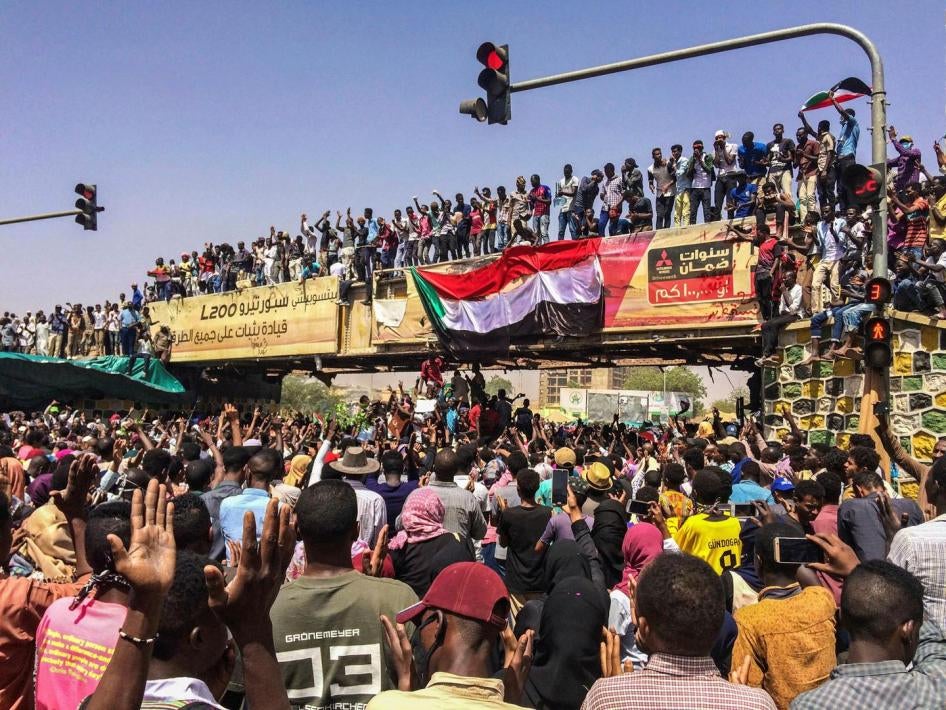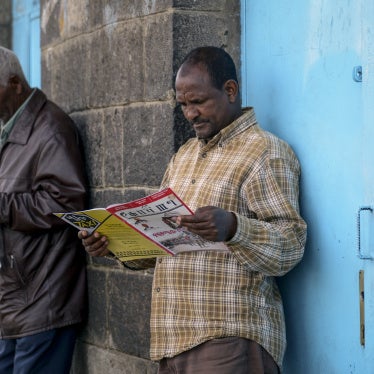(Nairobi) – Sudan’s transitional government should accelerate efforts to investigate and prosecute crimes against protesters by government security forces since December 2018, Human Rights Watch said today. December 2018 was the start of the wave of protests triggered by price increases that forced president Omar al-Bashir to step down on April 11, 2019.
“Scores of protesters, including teenagers and children, paid with their lives to force al-Bashir out, but a year on, the families of those killed are still searching for justice,” said Jehanne Henry, East Africa director at Human Rights Watch. “Sudanese authorities should step up their efforts to do right by these victims. Justice should not be denied or delayed.”
Government security forces, particularly the National Security and Intelligence Service (NISS), used lethal, excessive force including live ammunition to break up the protests, killing dozens of unarmed protesters every month. While the exact death toll of protesters is not known, independent groups estimated that over 100 people were killed between December 2018 and April 11, 2019, and Amnesty International verified at least 77 killings during that period.
On April 11, a transitional military council took power and announced that al-Bashir and several of his allies in the ruling National Congress Party were in detention. Salah Gosh, the former head of the NISS, was not detained and reportedly fled to Egypt in May.
Protesters remained at the sit-in demanding that military authorities hand over the government to civilian rule. On June 3, security forces violently dispersed the sit-in, killing over 120 protesters between June 3 and 18, according to doctors’ groups. The security forces were led by the paramilitary Rapid Support Forces (RSF), which have a documented record of abuses and attacks on civilians in Darfur, Southern Kordofan, and Blue Nile.
On August 17, opposition groups and the military agreed on a transitional government, forming a sovereign council composed of military and civilian leaders but led by military for the first 22 months, with a civilian prime minister and cabinet. Gen. Abdelfattah al-Bourhan and Mohamed Hamdan Daglo, “Hemedti,” commander of the RSF, are chair and deputy chair of the sovereign council respectively. Dr. Abdalla Hamdok, a former United Nations official, is prime minister.
Human Rights Watch concluded after documenting the events on June 3 and the following days that the killings and abuses could qualify as crimes against humanity because they were part of a government policy of using excessive, lethal force against unarmed protesters. Human Rights Watch recommended that the authorities should establish an independent entity to investigate abuses committed since December 2018, including sexual violence.
Despite the transitional government’s promises to ensure justice, it has made slow progress in the face of many serious problems, including a collapsing economy. In September, the authorities appointed a committee to investigate the June 3, 2019 crackdown. However, the committee has attracted wide criticism for its slow pace and inaccessibility, especially for victims of gender-based violence.
The authorities have not established a body specifically to address the crimes against protesters since December 2018, but are handling cases alleging violations against protesters in an ad hoc manner, if and when victims’ families come to them with evidence. Legal aid groups told Human Rights Watch that prosecutors, who lack resources and technical capacity, do not actively investigate but rather rely on victims’ families to collect evidence.
“It is very disappointing to protesters, victims, and their families, to see that justice is not moving one step further one year after ousting al-Bashir,” said Rifat Makkawi, a prominent human rights lawyer and director of PLACE legal aid center.
The Attorney General’s office has focused on corruption charges and the coup that brought al-Bashir into power in 1989. Al-Bashir was convicted of financial crimes on December 14, 2019, and sentenced to two years in a rehabilitation facility. On April 1, 2020, prosecutors announced new charges against him and 15 former military officers for their involvement in the 1989 coup. Twenty-three other former government officials are also detained in Kober federal prison, media reported. None has been charged with crimes related to the crackdowns against protesters or other human rights violations.
The transitional government should ramp up efforts to ensure justice for the protester killings by investigating cases and identifying suspects, including those at the top of the command chain, whether active or dismissed from service, Human Rights Watch said. This effort could take the form of a special entity, such as an investigation committee or special court. The international community, including donors, should seek to provide technical and financial support to achieve these goals.
The authorities should also move ahead with their cooperation with the International Criminal Court in its Darfur investigation, which includes executing outstanding arrest warrants against al-Bashir and two others who are in detention for their role overseeing serious crimes in Darfur. In February 2020, the prime minister and head of the sovereign council re-affirmed their commitment to cooperate with the court but have yet to take action to carry out that commitment.
“Sudan’s leaders should not let protesters’ sacrifices be in vain,” Henry said. “They need to step up efforts at investigating and prosecuting those responsible for killings and other crimes against protesters, including officials at the highest levels.”








